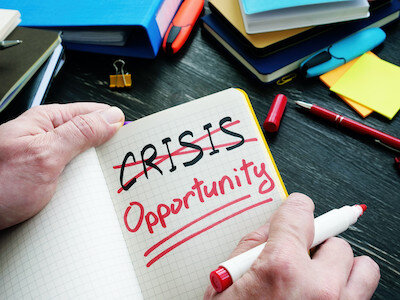The One Question We Should NOT Ask At This Time
When will we return to normal?
The one question we should not be asking at this time
When will we return to normal?
I recently wrote this post about the return to the office (or not) following the COVID-19 pandemic.
John Belchamber responded to the post with this comment:
“Perhaps the scariest question I’m hearing/reading is “When will things get back to normal?” Let’s learn and adjust not return to ‘the way we’ve always done things’!”
John inspired me to write this article.
Opportunity
The one thing I am really hoping for following this crisis it that we do not return to ‘normal’.
Albeit this crisis has resulted in widespread deaths, job losses, financial hardship and emotional turmoil for so many, it has also afforded us many opportunities.
We have been forced to change in ways we could not have predicted and many organisations, their leadership, their teams and their employees have risen to the occasion and made the best of the situation.
We have learnt so much that we can leverage moving forward.
Many employees are far more productive working from home, enjoy it and do not want to return to an office full-time.
Many employees cannot wait to get back to the office and enjoy the spontaneity of human interaction.
Many employees would like a choice.
We have made remote working over an extended period of time a success.
Work is an activity not a location.
We have gone digital.
The workday is not 9 to 5.
We can communicate, collaborate and create in so many different ways.
We have the capacity for multi-tasking – working, caring and educating. It was difficult but not impossible.
We have reduced the need for national and international travel and the massive cost associated with it.
Choice
Note that I am talking about those organisations who do not need their employees to be physically present at the premises.
We have a choice.
However, many of the conversations I am hearing and reading seem to be black and white.
Everyone will return back to the office or everyone will continue to work from home.
These blanket statements do not appear to take into consideration what we have learnt and what employees want.
Let’s not make a knee-jerk decision and exclude employees from the conversation.
There are many options available for organisations to get the most from their people wherever they work.
As stated earlier, work is an activity not a location.
Before and after
What are employees doing now that they were not doing before? How have they managed to accommodate this change?
What has worked well and what has not worked so well? What practices do we want to keep?
If we don’t identify these things now, they will get lost in the mis-guided focus to ‘return to normal.’
Options
It doesn't have to be home or office it could be a combination of the two. Even better, it could also be ‘work from anywhere’.
When the attitude towards work is ‘something I do’ not ‘somewhere I go’ we should not be locked into a location.
Now that we have proved we can use the digital platforms, collaboration and communication tools, video conferencing services, there should be no restriction.
Check out the extensive list of available tools for remote teams from Collaboration Superpowers.
The options include the office, co-working spaces, libraries , cafes, or our home.
There will also be far more flexibility to when employees work. There will still be set times for meeting and collaborative activities but when employees start and stop work will factor in their personal circumstances and need.
The key will be to set people up for success whatever options they choose. They need the right infrastructure, technology, connectivity, tools and resources and assurance that they and their employers are not increasing any risk or security vulnerability.
Management
The biggest shift will be how employees are managed.
Productivity cannot continue to be measured by time at a desk. High performers are not those that start work before everyone else and are the last to finish.
Managers have to focus on results and outcomes. It has to be about accomplishment not activity.
I wrote this article back in August 2019.
Managers will have to enable employees to prove their accomplishments without being micromanaged.
There will also have to be an increased focus on the mental wellbeing of employees and a sense of shared purpose and connection to purpose.
Traditional management structures will change. If we move to a focus on management by outcomes, the current organisational hierarchies don't make any sense. There will be a move to flatter, more agile and flexible structures which will require different management skills and capabilities.
Let’s not return to how it was
This pandemic has presented us with so many opportunities for better ways of working.
Let’s not waste it.


